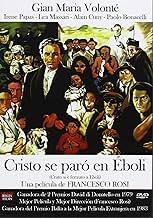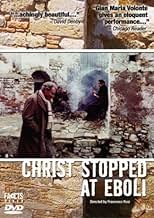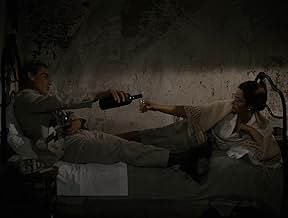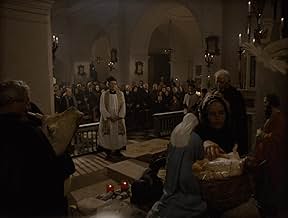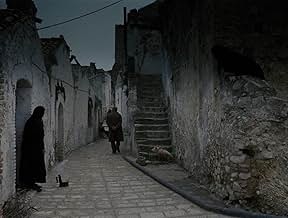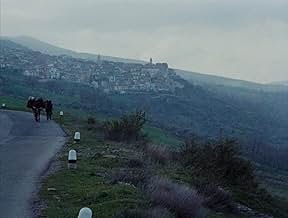IMDb RATING
7.7/10
4.6K
YOUR RATING
A doctor in Fascist Italy is exiled to a remote village for his political views.A doctor in Fascist Italy is exiled to a remote village for his political views.A doctor in Fascist Italy is exiled to a remote village for his political views.
- Won 1 BAFTA Award
- 7 wins & 1 nomination total
Enzo Vitale
- Dottore Milillo
- (as Vincenzo Vitale)
Featured reviews
This is a story that had to be told. It might not have been had not Carlo Levi been exiled in 1935 for his anti-fascist activities to a town in the remote, impoverished Southern province of Lucania. His non-ideological, unsentimentalised, beautifully observed memoir of the year he spent there has been vividly realised by Francesco Rosi whose films are noted for their depiction of inequalities and injustices. The political activism of Gian Maria Volonté has been well-documented so this film could be seen as a distillation of the beliefs of both actor and director. The author himself had passed away four years earlier but this adaptation would surely have met with his approval.
Volonté's mellow, nuanced and understated portrayal of Levi, sadly overlooked in terms of awards, is indisputably one of his finest. It was the performance of Lea Massari in a comparatively small role as his wife that was recognised and very good she is too. Also appearing are the glorious Irene Papas and the always enigmatic Alain Cuny. Rosi of course was renowned for his skill with actors.
This is about a region that time has forgotten and for which its nation does not care. Looked down upon by the rich, industrialised North, economically depressed, lacking the basics of life and with no facilities, its residents have succumbed to superstition and mysticism. As for Religion "Christ stopped short of here" and its sole representative is a drunken, discredited priest. The pro-fascist mayor, played by Paolo Bonacelli, tries to get the inhabitants interested in the radio broadcasts of Mussolini but they are totally indifferent and simply do not care that Addis Abbaba has fallen! Ironically it was the young men of this region who supplied so much of the cannon fodder in the trenches of WW1 which was the subject of Rosi's earlier 'Uomini Contro'.
Originally made for television this slightly truncated version certainly belies its length and epitomises Rosi's aim to make his audience more than just 'passive spectators'. Piero Piccioni has composed a haunting score and the cinematography of Pasqualino de Santis is breathtaking. Unlike so many Italian films it is not marred by the booming voices of post-synchronisation and the dubbing of the gallery of characters is expertly done.
Carlo Levi wrote that "the whole of life is a tragedy without a stage" but here Rosi does not lay it on with a trowel and this magnificent film becomes, despite the hardships it depicts, an affirmation of life.
Volonté's mellow, nuanced and understated portrayal of Levi, sadly overlooked in terms of awards, is indisputably one of his finest. It was the performance of Lea Massari in a comparatively small role as his wife that was recognised and very good she is too. Also appearing are the glorious Irene Papas and the always enigmatic Alain Cuny. Rosi of course was renowned for his skill with actors.
This is about a region that time has forgotten and for which its nation does not care. Looked down upon by the rich, industrialised North, economically depressed, lacking the basics of life and with no facilities, its residents have succumbed to superstition and mysticism. As for Religion "Christ stopped short of here" and its sole representative is a drunken, discredited priest. The pro-fascist mayor, played by Paolo Bonacelli, tries to get the inhabitants interested in the radio broadcasts of Mussolini but they are totally indifferent and simply do not care that Addis Abbaba has fallen! Ironically it was the young men of this region who supplied so much of the cannon fodder in the trenches of WW1 which was the subject of Rosi's earlier 'Uomini Contro'.
Originally made for television this slightly truncated version certainly belies its length and epitomises Rosi's aim to make his audience more than just 'passive spectators'. Piero Piccioni has composed a haunting score and the cinematography of Pasqualino de Santis is breathtaking. Unlike so many Italian films it is not marred by the booming voices of post-synchronisation and the dubbing of the gallery of characters is expertly done.
Carlo Levi wrote that "the whole of life is a tragedy without a stage" but here Rosi does not lay it on with a trowel and this magnificent film becomes, despite the hardships it depicts, an affirmation of life.
This long TV film was very influential (on my younger self) which has remained at the forefront of my memory since it was shown on the BBC over forty years ago.
Some people might find this a bit slow and there's not a lot of action. It is deliberately slow and long (3 hours) to give you a similar immerse experience to Carlo Levi himself has as he is thrusted into that strange alien world. As you'll know, it's a true story of a doctor from northern Italy exiled to a southern backwater, a place not just separated by miles from civilisation but by centuries. The film is about how this learned 20th century man copes with and leans to love the harsh medieval world he is forced to be part of. We share this journey with him, we feel we are there. It's a beautiful, thoughtful and fascinating film.
Some people might find this a bit slow and there's not a lot of action. It is deliberately slow and long (3 hours) to give you a similar immerse experience to Carlo Levi himself has as he is thrusted into that strange alien world. As you'll know, it's a true story of a doctor from northern Italy exiled to a southern backwater, a place not just separated by miles from civilisation but by centuries. The film is about how this learned 20th century man copes with and leans to love the harsh medieval world he is forced to be part of. We share this journey with him, we feel we are there. It's a beautiful, thoughtful and fascinating film.
I have seen this TV film several times after reading Carlo Levi's book and having been to the Basilicata area in which Levi was exiled.
I consider the film to represent the book's aims which is to show the oppressed state of the peasants in Basilicata, the remoteness and lack of care of central government in Rome and the way in which the fascists could control the local area with very limited support - but of the people who mattered, the mayor, doctor, police. The rest of the populace could be, and were ignored.
A brief nitpicking comment on the title. It comes from something the priest said - on the lines that Christ never reached Aliano but stopped at Eboli some 150 miles distant. Eboli plays no part in Levi's book and the start of the film is wrong in showing him changing trains there, and picking up the stray dog. To get to Matera, where he started his exile he changed in Bari and would not have gone anywhere near Eboli.
I consider the film to represent the book's aims which is to show the oppressed state of the peasants in Basilicata, the remoteness and lack of care of central government in Rome and the way in which the fascists could control the local area with very limited support - but of the people who mattered, the mayor, doctor, police. The rest of the populace could be, and were ignored.
A brief nitpicking comment on the title. It comes from something the priest said - on the lines that Christ never reached Aliano but stopped at Eboli some 150 miles distant. Eboli plays no part in Levi's book and the start of the film is wrong in showing him changing trains there, and picking up the stray dog. To get to Matera, where he started his exile he changed in Bari and would not have gone anywhere near Eboli.
Christ Stopped at Eboli is a captivating film experience (or do we call it a series given its in 4 parts on ah let's not split Southern Italian hairs, shall we now), mostly for how it raises so many ideas and has the time to explore them, though it is so episodic and gradually moving in many ways that it's sort of disappointing that one doesn't connect so much on any kind of emotional level to the men and women and occasional children that Carlo Levi meets and grows closer to and helps as a doctor (and sometimes cannot) over his year in exile as an anti-fascist in 1935 Italy.
There is one conversation that Carlo and the Mayor of this village near Eboli (hence the title), though this mayor speaking tries to do so not as the Mayor vut as a friend, and which stems from a letter Carlo was intending to send out from town to a female friend up North. The letter is telling about how he sees the peasants and townsfolk as not really being this or that but are there own people, and the Mayor Luigi gently but firmly says this isn't so and that the peasants just want more land (and tries to argue that conquering other lands like Italy tried to do in Africa) will accomplish that, and there are other ideas bounced back and forth between the men.
It's possibly one of the times in the film where there's a sense of conflict, and that it is all over the ideas presented - about who the peasants claim to be or who they are and how Fascist ideology spreads and is easy to detect but difficult to eradicate (you can see it right here in America right now, this is where I'd usually say I digress but no, this is a key point), and that one has to really rethink what 'The State' may be as an entity, and if it has to be rethought and changed entirely, to address so many issues that come about with like Nationalism and Pride and that feeling some who have almost nothing that if they, say, go off and fight in a war and come back as a hero it's worth it even at the risk of death, or that othering others and closing ranks with their own is so natural as breathing air, that's what may need to be done.
I may also be including in these observations what Carlo himself comes to understand by the time he's home years later and is talking with other intellectuals who think it's more cut and dry. I really was engaged with these scenes and any time really that Rosi and his writers were having people talk about such things- whether they were these exact conversations in reality or Levi was simplifying things for his book and by proxy the film, I'm pretty sure is the case but can't say for sure- and they are when I leaned forward most to pay attention to the film. I only wish much of the rest of the story/stories, at least for me, engaged me a little more emotionally speaking.
This isn't to say there aren't a couple of characters who have an impact, or at least impress upon Carlo just what life is like in the village: the mother who Carlo stays with (and says she's had 17 pregnancies, and she is really mother and father to all of her children since no one has stayed or have gone to America) and the one Priest who can't seem to reach anyone in the village (they decisively call him a drunk, though is it because they're such crappy people he drinks, one wonders) who Carlo also connects with somewhat, are two such examples. Other times there are some charming and interesting scenes where characters speak on their superstitions and other such issues, and there are some gorgeous shots of the landscapes and scenery (one should say it's due to the skill with finding the right light and tones for DP De Santis that it is so, not just what it is) and the musical score by Piccioni is lovely.
While Carlo does become certainly by episode 4 so emeshed in the community (it helps he has a pretty good track record as a non-practicing but well-learned doctor in a place where the only other medical help sucks, leave to being the Luke Wilson in Idiocracy effect one supposes, now I do digress), it doesn't mean we get a sense that Carlo has grown close particularly with any one person really. This has a pretty terrific reputation, so I looked at some of the less charitable reviews of the film and, putting aside the "it's boring" takes which don't help much, it did ring perhaps more true than not for me that the film does stand at a place (and I don't know if this is the case with the book since that's another medium altogether) where it is at an intellectual high ground, in other words the sort of peasants this is about... would they sit and watch a film like Christ Stopped at Eboli, or is it for us cineastes and art-house film buffs to sit and chew over?
I think Christ Stopped at Eboli benefits most of all if nothing else from being (I hate this coopted dumb phrase but I'll use it anyway) fair and balanced look at how someone who has his own ideas about society and fascism and anti-fasicsm is ironically put into instead of a prison and exile situation where he has to see how "they" live. I think after years of like the NY Times style pieces of "What do the people in diners *really* think" when it comes to looking at "them" and political leaders which are often not genuine, it is good to see a work of art that does try to look at people like this simply and plainly and, through a POV actor as gifted and compelling like Volante when largely listening and observing.
I just wish I felt more shaken on a more profound level by the sense of something more... poetic, perhaps (as a useful comparison, Tree with Wooden Clogs, which I thought this might more resemble, comes to mind). It is beautiful and well made, and yet it is like going to and having a really gigantic mutli-course meal at a restaurant, you'll remember to leave a nice tip and a good rating online, but will one come back to it? Hmm. 7.5/10.
There is one conversation that Carlo and the Mayor of this village near Eboli (hence the title), though this mayor speaking tries to do so not as the Mayor vut as a friend, and which stems from a letter Carlo was intending to send out from town to a female friend up North. The letter is telling about how he sees the peasants and townsfolk as not really being this or that but are there own people, and the Mayor Luigi gently but firmly says this isn't so and that the peasants just want more land (and tries to argue that conquering other lands like Italy tried to do in Africa) will accomplish that, and there are other ideas bounced back and forth between the men.
It's possibly one of the times in the film where there's a sense of conflict, and that it is all over the ideas presented - about who the peasants claim to be or who they are and how Fascist ideology spreads and is easy to detect but difficult to eradicate (you can see it right here in America right now, this is where I'd usually say I digress but no, this is a key point), and that one has to really rethink what 'The State' may be as an entity, and if it has to be rethought and changed entirely, to address so many issues that come about with like Nationalism and Pride and that feeling some who have almost nothing that if they, say, go off and fight in a war and come back as a hero it's worth it even at the risk of death, or that othering others and closing ranks with their own is so natural as breathing air, that's what may need to be done.
I may also be including in these observations what Carlo himself comes to understand by the time he's home years later and is talking with other intellectuals who think it's more cut and dry. I really was engaged with these scenes and any time really that Rosi and his writers were having people talk about such things- whether they were these exact conversations in reality or Levi was simplifying things for his book and by proxy the film, I'm pretty sure is the case but can't say for sure- and they are when I leaned forward most to pay attention to the film. I only wish much of the rest of the story/stories, at least for me, engaged me a little more emotionally speaking.
This isn't to say there aren't a couple of characters who have an impact, or at least impress upon Carlo just what life is like in the village: the mother who Carlo stays with (and says she's had 17 pregnancies, and she is really mother and father to all of her children since no one has stayed or have gone to America) and the one Priest who can't seem to reach anyone in the village (they decisively call him a drunk, though is it because they're such crappy people he drinks, one wonders) who Carlo also connects with somewhat, are two such examples. Other times there are some charming and interesting scenes where characters speak on their superstitions and other such issues, and there are some gorgeous shots of the landscapes and scenery (one should say it's due to the skill with finding the right light and tones for DP De Santis that it is so, not just what it is) and the musical score by Piccioni is lovely.
While Carlo does become certainly by episode 4 so emeshed in the community (it helps he has a pretty good track record as a non-practicing but well-learned doctor in a place where the only other medical help sucks, leave to being the Luke Wilson in Idiocracy effect one supposes, now I do digress), it doesn't mean we get a sense that Carlo has grown close particularly with any one person really. This has a pretty terrific reputation, so I looked at some of the less charitable reviews of the film and, putting aside the "it's boring" takes which don't help much, it did ring perhaps more true than not for me that the film does stand at a place (and I don't know if this is the case with the book since that's another medium altogether) where it is at an intellectual high ground, in other words the sort of peasants this is about... would they sit and watch a film like Christ Stopped at Eboli, or is it for us cineastes and art-house film buffs to sit and chew over?
I think Christ Stopped at Eboli benefits most of all if nothing else from being (I hate this coopted dumb phrase but I'll use it anyway) fair and balanced look at how someone who has his own ideas about society and fascism and anti-fasicsm is ironically put into instead of a prison and exile situation where he has to see how "they" live. I think after years of like the NY Times style pieces of "What do the people in diners *really* think" when it comes to looking at "them" and political leaders which are often not genuine, it is good to see a work of art that does try to look at people like this simply and plainly and, through a POV actor as gifted and compelling like Volante when largely listening and observing.
I just wish I felt more shaken on a more profound level by the sense of something more... poetic, perhaps (as a useful comparison, Tree with Wooden Clogs, which I thought this might more resemble, comes to mind). It is beautiful and well made, and yet it is like going to and having a really gigantic mutli-course meal at a restaurant, you'll remember to leave a nice tip and a good rating online, but will one come back to it? Hmm. 7.5/10.
"Christ stopped at Eboli" (or in Italian "Cristo si e fermato a Eboli") is a rather hard to find movie. The theatrical release is about 2,5 hours long, but I saw the TV movie, that is nearly an hour longer.
The movie is about the banishment of narrator Carlo Levi in 1935 - 1936. Levi was a left wing intellectual and critic of Italian dictator Benito Mussolini.
The story is situated during the war between Italy and Abyssinia (todays Ethiopia), so before the Second World War.
In spite of the title, the movie is neither about Christ nor about Eboli.
Not about Eboli because the train station of Eboli is only a stopover in the journey of Levi to his banishment location of Grassano and Luciano, two small villages in the Southern region of Lucania (today Basilicata).
Not about Christ because in the remote villages of Grassano and Lucania the Roman Catholic faith is only a surface below which ancient pagan beliefs still lives on.
In his banishment location Levi enjoys a great deal of freedom. Mussolini is more concerned with getting rid of him in the political discourse than to punish him. At the beginning Levi is first of all an observing outsider but gradually he integrates with the local community, in no small measure thanks to his medical knowledge.
"Christ stopped at Eboli" is a film about the wealth difference between North- and South Italy. Levi encounters instances of malaria in his banishment location. Many citizens try to flee the poverty by emigrating to the United States. The "emotional distance" to New York seems almost shorter than to Rome.
But "Christ stopped at Eboli" is in particular a film about the mixture of Christianity and pagan beliefs. In many instances we see this combination in horror like movies (compare "The wicker man", 1973, Robin Hardy) but in "Christ stopped at Eboli" it is used to full effect in a social drama.
The film is above all a slow movie, in the good sense of the word. The central theme is the gradual integration of he main character in the local community, "gradual" being the essential word in this sentence.
Francesco Rosi is not a very well known director. He is of the same generation as the more popular Taviani brothers. "Christ stopped at Eboli" has also some resemblance with some Taviani movies, situated as it is in the poor South. I am thinking of "Padre Padrone" (1977) in particular. Compared with "Christ stopped at Eboli" "Padre Padrone" is however nearly an action movie.
The movie is about the banishment of narrator Carlo Levi in 1935 - 1936. Levi was a left wing intellectual and critic of Italian dictator Benito Mussolini.
The story is situated during the war between Italy and Abyssinia (todays Ethiopia), so before the Second World War.
In spite of the title, the movie is neither about Christ nor about Eboli.
Not about Eboli because the train station of Eboli is only a stopover in the journey of Levi to his banishment location of Grassano and Luciano, two small villages in the Southern region of Lucania (today Basilicata).
Not about Christ because in the remote villages of Grassano and Lucania the Roman Catholic faith is only a surface below which ancient pagan beliefs still lives on.
In his banishment location Levi enjoys a great deal of freedom. Mussolini is more concerned with getting rid of him in the political discourse than to punish him. At the beginning Levi is first of all an observing outsider but gradually he integrates with the local community, in no small measure thanks to his medical knowledge.
"Christ stopped at Eboli" is a film about the wealth difference between North- and South Italy. Levi encounters instances of malaria in his banishment location. Many citizens try to flee the poverty by emigrating to the United States. The "emotional distance" to New York seems almost shorter than to Rome.
But "Christ stopped at Eboli" is in particular a film about the mixture of Christianity and pagan beliefs. In many instances we see this combination in horror like movies (compare "The wicker man", 1973, Robin Hardy) but in "Christ stopped at Eboli" it is used to full effect in a social drama.
The film is above all a slow movie, in the good sense of the word. The central theme is the gradual integration of he main character in the local community, "gradual" being the essential word in this sentence.
Francesco Rosi is not a very well known director. He is of the same generation as the more popular Taviani brothers. "Christ stopped at Eboli" has also some resemblance with some Taviani movies, situated as it is in the poor South. I am thinking of "Padre Padrone" (1977) in particular. Compared with "Christ stopped at Eboli" "Padre Padrone" is however nearly an action movie.
Did you know
- TriviaThe title of the film and its source novel comes from an expression by the people of Gagliano who say of themselves, "Christ stopped short of here, at Eboli" which means, in effect, that they feel they have been bypassed by Christianity, by morality, by history itself-that they have somehow been excluded from the full human experience.
- GoofsOn the bus, the way Carlo holds the dog changes.
- Quotes
Luisa Levi: You'd need a woman here.
Carlo Levi: Yes, I would. But it's not easy.
Luisa Levi: Come on, don't exaggerate. Don't tell me that here even finding a cleaning lady is impossible.
Carlo Levi: Here a woman wouldn't go in the house of a single man. Just spending time together implies sleeping together.
Luisa Levi: You can't be serious.
Carlo Levi: Oh, yes I am.
- Alternate versionsThere are many versions ranging from 120 minutes to 222 minutes. The longest version available in the U.S. is 222 minutes and is available from the Criterion Collection on Blu-ray.
- ConnectionsFeatured in Il cineasta e il labirinto (2004)
- How long is Christ Stopped at Eboli?Powered by Alexa
Details
- Release date
- Countries of origin
- Official site
- Language
- Also known as
- Christus kam nur bis Eboli
- Filming locations
- Aliano, Matera, Basilicata, Italy(second house where Levi lives)
- Production companies
- See more company credits at IMDbPro
Box office
- Gross US & Canada
- $78,736
- Opening weekend US & Canada
- $9,006
- Apr 7, 2019
- Gross worldwide
- $78,736
Contribute to this page
Suggest an edit or add missing content



